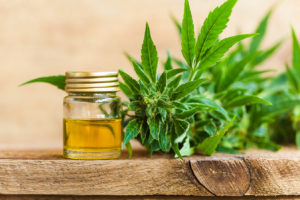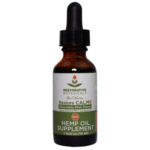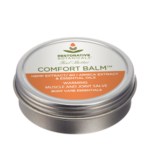Is CBD Right for Me?
By Lucas Tims, ND, FABNO
 Chances are you’ve heard of CBD. Perhaps you’ve read about it online or even seen signs for local shops selling it. Maybe a friend has told you they are taking it for pain relief or anxiety. You may have even come across YouTube videos of children being given it in the middle of a seizure and, seemingly within moments, returning to a normal state. In many ways, the purported benefits of taking CBD seems almost too good to be true, for something easily purchased online or from a supplement store. Despite all of the hype, there are still many unknowns. So, let’s take a look at what we actually do know about CBD at this time.
Chances are you’ve heard of CBD. Perhaps you’ve read about it online or even seen signs for local shops selling it. Maybe a friend has told you they are taking it for pain relief or anxiety. You may have even come across YouTube videos of children being given it in the middle of a seizure and, seemingly within moments, returning to a normal state. In many ways, the purported benefits of taking CBD seems almost too good to be true, for something easily purchased online or from a supplement store. Despite all of the hype, there are still many unknowns. So, let’s take a look at what we actually do know about CBD at this time.
What is CBD?
Cannabidiol (CBD) is a naturally-occurring compound found in the cannabis plant and is the second most abundant of the active ingredients after tetrahydrocannabinol (THC). Unlike THC, however, CBD does not cause any euphoria or other mind-altering effects. According to a report from the World Health Organization, “In humans, CBD exhibits no effects indicative of any abuse or dependence potential…. To date, there is no evidence of public health-related problems associated with the use of pure CBD.” Due to the absence of safety concerns, CBD has not been as strictly regulated as THC. However, the laws around CBD are still evolving and remain convoluted and unclear.
Why does CBD not produce a “high” like THC? It has to do with its effects on a complex web of receptors known as the endocannabinoid system (ECS). The ECS was discovered in the 1960s and 70s, from research into the effects of cannabis on the human body. This led to further discoveries that our bodies actually create their own endogenous cannabinoids, which act as messengers to send signals from different tissues to the brain. Within the ECS there are CB1 and CB2 receptors. CB1 receptors are mainly found in the brain and central nervous system, whereas CB2 receptors are most often found on the cells of our immune system. THC is able to directly bind to CB1 receptors, leading to the psychoactive effects or “high.” CBD, however, does not directly trigger either CB1 or CB2 receptors. Instead, it modifies the receptors’ ability to bind to the other cannabinoids. Additionally, CBD plays a larger role in the ECS by influencing other types of receptors and enhancing your natural levels of endocannabinoids. Because of this, CBD exhibits a wide range of potential benefits, including as a preventative medicine.
Types of CBD products
CBD is available as edibles, oils, tinctures, teas, topical creams and patches, and vape pens. Similar to natural supplements, CBD manufacturing is not regulated by the  FDA. That means you must exercise due diligence when choosing which products to buy. Studies have shown that a large percentage of CBD products found on line were contaminated or even contained large amounts of THC. The best way to ensure the quality of CBD products is to discuss it directly with the company from which you are purchasing. Ask about third party testing and other quality assurance measures such as USP or GMP.
FDA. That means you must exercise due diligence when choosing which products to buy. Studies have shown that a large percentage of CBD products found on line were contaminated or even contained large amounts of THC. The best way to ensure the quality of CBD products is to discuss it directly with the company from which you are purchasing. Ask about third party testing and other quality assurance measures such as USP or GMP.
There are also a number of different CBD preparations, based on how it is extracted or isolated from the plant. Full spectrum extracts may contain other cannabinoids and fats, whereas distillates or isolates are more likely to contain only pure CBD. Because of these differences, many individuals may have different experiences and results based on the type of product they are taking and how it is prepared.
Research on CBD benefits
As discussed, CBD has been touted for a wide variety of health issues, but the strongest scientific evidence is for its effectiveness in treating childhood epilepsy and other seizure disorders. In numerous studies, CBD was able to reduce the number of seizures, and in some cases, it was able to stop them altogether. As previously mentioned, YouTube videos of the effects of CBD on these children and their seizures are readily available, and they are quite striking. Recently the FDA a
pproved the first-ever cannabis-derived medicine for these conditions, Epidiolex, which contains CBD.

Relief from anxiety and depression with CBD is also supported by clinical research. For patients who suffer through the misery of insomnia, studies suggest that CBD may help with both falling asleep and staying asleep.
In addition, CBD may offer an option for treating different types of chronic pain. Recent animal studies have reported that CBD applied on the skin could help lower pain and inflammation due to arthritis. Another study demonstrated the mechanism by which CBD inhibits inflammatory and neuropathic pain, two of the most difficult types of chronic pain to treat. Given the current opiate epidemic in the US, safer alternatives for pain relief are needed and further human studies with CBD are warranted.
Legal issues
CBD is readily obtainable in most parts of the United States, though its exact legal status is in a constant state of flux. All 50 states have laws legalizing CBD with varying degrees of restriction, and while the federal government still considers CBD in the same class as marijuana, it doesn’t habitually enforce against it. In December 2015, the FDA eased the regulatory requirements to allow researchers to conduct CBD trials. Currently, many people obtain CBD online without a medical cannabis license. The federal government’s position on CBD is not clear and depends in part on whether the CBD comes from hemp or marijuana. The legality of CBD is expected to change, as there is currently bipartisan consensus in Congress to make the hemp crop legal, which would, for all intents and purposes, make CBD difficult to prohibit.
Summary
At the end of the day, CBD oils and other products are supplements and should be used as part of an overall healthy lifestyle. I encourage my patients to try CBD products, but only after working on cleaning up the diet, addressing nutritional deficiencies, exercising and introducing stress reduction practices like meditation. If you decide to try CBD, I encourage you to talk with your doctor first, to make sure it fits or is even necessary for your overall plan for health and wellness.





